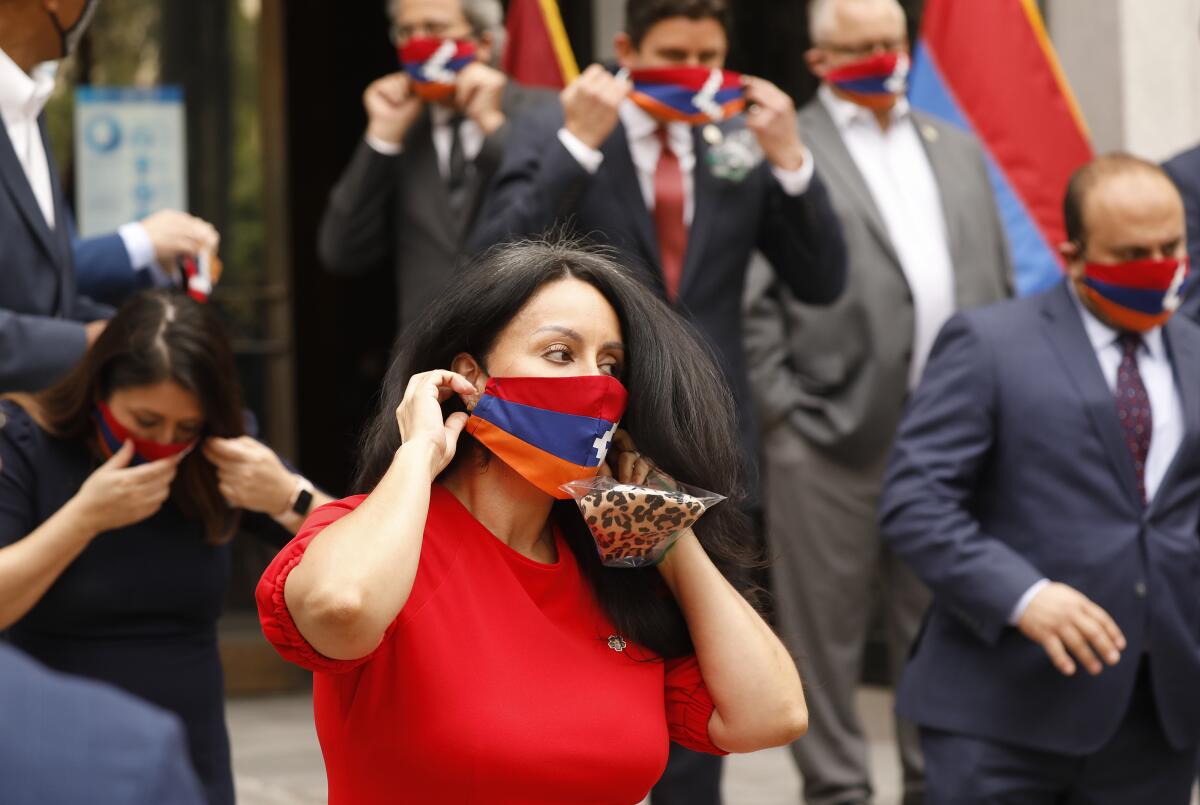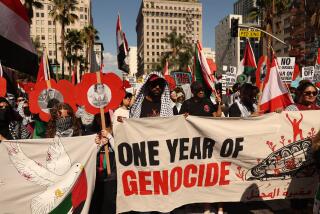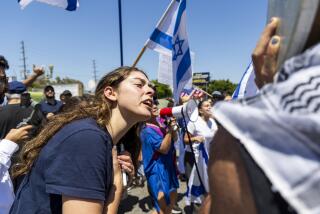‘We hear you’: Officials gather at L.A. City Hall in solidarity with Armenian community

A group of elected officials gathered at Los Angeles City Hall on Monday to decry the deadly conflict between Armenia and neighboring Azerbaijan and call on the Trump administration to intervene diplomatically in the newly reignited clash over a tiny contested border region between the two countries in the Southern Caucasus.
Representatives from Los Angeles, Sacramento and Washington blame Azerbaijan and nearby Turkey, which supports the country, for inciting the violence that began Sept. 27 in the Nagorno-Karabakh region — referred to as the Republic of Artsakh by Armenians. The area is internationally recognized as part of Azerbaijan but its population of about 150,000 is majority ethnic Armenian. Azerbaijan’s leaders maintain they have only responded to incursions by the other side.
“As Armenians, we care very deeply about this part of the world, and we care very deeply about the slaughter of Armenian people,” Los Angeles City Councilman Paul Krekorian said on the steps of City Hall. With the conflict now heading into a second week, there’s fear the infighting could spark an all-out war, with the potential to draw in superpowers such as Russia and Turkey.
Los Angeles’ large Armenian community has responded in force to the conflict playing out more than 7,000 miles ways. Monday’s gathering in downtown Los Angeles comes on the heels of more than a week of demonstrations across the county intended to bring awareness to the clash.
On Saturday and Sunday evenings, demonstrators rallied in front of the CNN building in Hollywood to demand more accurate news coverage of the events overseas. Activists also blocked traffic on sections of the 101 and 170 freeways over the weekend. A march to the Turkish consulate is planned for Sunday, according to Alex Galitsky, communications director for the Armenian National Committee of America, Western Region.
Los Angeles Mayor Eric Garcetti, speaking on Zoom, said he understood the local outcry.
“I hear you, I see you. More importantly, we hear you and we see you,” Garcetti said, adding that L.A.’s status as a “global crossroads” ideally positions it to facilitate an international dialogue and ultimately call for peace.
Protesters rallied outside media offices in Hollywood over the weekend in demonstrations calling attention to violence in Nagorno-Karabakh, or Artsakh, which has become the subject of renewed fighting between Armenia and Azerbaijan over the past week.
Several officials, including state Assemblyman Adrin Nazarian, equated the violence in the separatist region as a continuation of the Armenian Genocide of 1915.
“And so if we really mean what we say by saying, ‘Never again,’ this is the time to act,” said Nazarian, who represents the 46th district. “This is the time for the federal government to step up.”
Laurence Broers, a scholar on the conflict, said Azerbaijan instigated this attack. However, he said the country still sees it as a defensive war — to reclaim land lost nearly three decades ago in what’s known as the Nagorno-Karabakh War.
Nasimi Aghayev, Azerbaijan’s consul general in the Western U.S., said about 800,000 Azerbaijanis were forced to flee their homes as a result of that war, calling it a “pure ethnic cleansing.” Azerbaijani officials view the contested territory — as well as seven adjacent districts — as Azerbaijani land, he said.
Aghayev points to Armenian forces as starting the recent fighting and accused Armenia of working in concert with Russia. Armenia and Russia do have a military pact, and Russia has a base on Armenian soil.
But there’s no indication Russia has picked a side in the conflict, Broers said.
U.S. Rep. Adam Schiff (D-Burbank) said by phone last week that the relationship between Armenia and Russia concerns him and that it adds impetus for the U.S. to intervene diplomatically.
Schiff, who was present at City Hall on Monday, has introduced a resolution with Rep. Jackie Speier (D-Hillsborough) that would call on Azerbaijan to stop fighting and agree to the installation of ceasefire-monitoring equipment along the so-called line of contact in the contested region between it and Armenia. It would also tell Turkey to stay out of the conflict.
It’s now up to the federal government to take action, Nazarian said. Though state leaders have taken steps — including recognizing Artsakh as an independent republic — there’s a limit on their control over the country’s foreign policy, he said.
“The reality is that whatever we do below the federal level is symbolic.”
More to Read
Sign up for Essential California
The most important California stories and recommendations in your inbox every morning.
You may occasionally receive promotional content from the Los Angeles Times.











